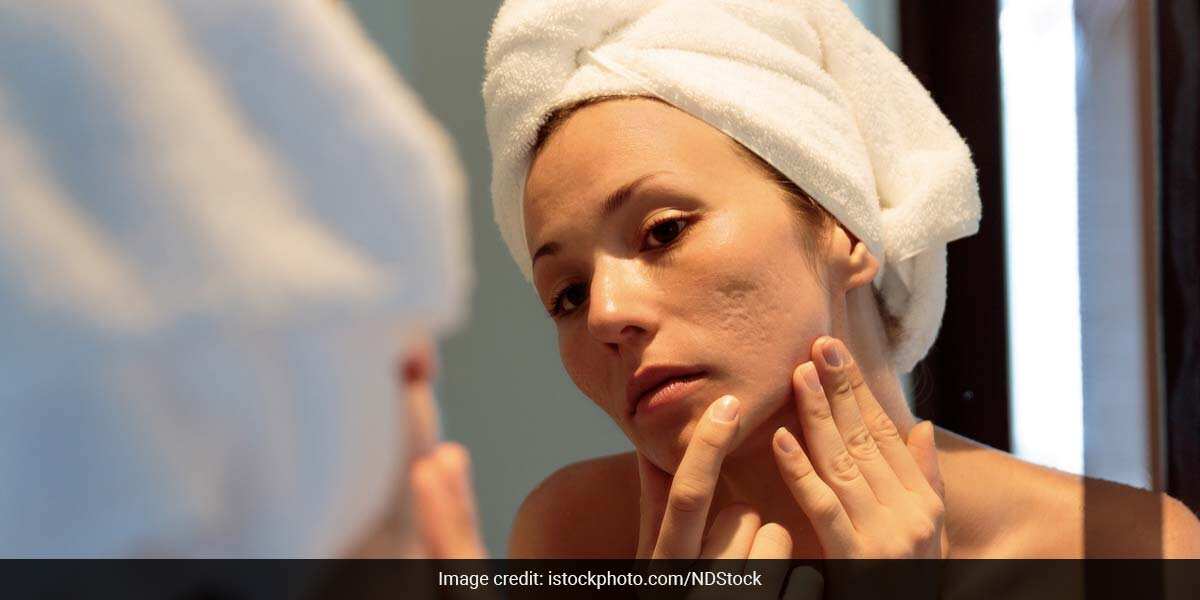Contrary to popular belief, acne doesn't necessarily vanish with the transition from adolescence to adulthood. Adult acne encompasses a broad spectrum of presentations, ranging from occasional blemishes to chronic, treatment-resistant breakouts.

Hormonal imbalances, particularly in women, are key drivers of adult acne
Adult acne, characterized by the onset of acne beyond the teenage years, requires a nuanced understanding of its causes, manifestations, and effective management strategies. This comprehensive guide aims to demystify adult acne, offering insights into its multifactorial etiology and empowering individuals with practical approaches to tackle persistent breakouts.
Understanding adult acne:
Contrary to popular belief, acne doesn't necessarily vanish with the transition from adolescence to adulthood. Adult acne encompasses a broad spectrum of presentations, ranging from occasional blemishes to chronic, treatment-resistant breakouts. While hormonal fluctuations and genetic predisposition play pivotal roles, environmental factors such as stress, diet, and skincare practices can exacerbate acne symptoms in adults. Understanding the complex interplay of these factors is essential for devising targeted treatment regimens and improving outcomes.
Causes and mechanisms of adult acne:
Hormonal imbalances, particularly in women, are key drivers of adult acne. Fluctuations in androgen levels can stimulate sebaceous gland activity, leading to increased sebum production and pore blockage. Genetic predisposition further amplifies susceptibility to acne, with familial patterns often observed in adult acne cases. Environmental influences, including diet, pollution, and skincare products, can exacerbate acne by promoting inflammation and pore occlusion. Addressing these underlying mechanisms is crucial for effective acne management in adults.
Manifestations and clinical presentation:
Adult acne manifests through a variety of lesions, including comedones, inflammatory papules, pustules, nodules, and cysts. Unlike adolescent acne, which predominantly affects the face, adult acne may also involve the neck, chest, back, and shoulders. The clinical presentation can vary widely among individuals, ranging from mild, occasional breakouts to severe, cystic acne with scarring. Proper diagnosis and classification of acne lesions are essential for tailoring treatment strategies to individual needs.
Diagnostic approach to adult acne:
Diagnosing adult acne requires a comprehensive evaluation of clinical history, physical examination, and laboratory assessments. Detailed inquiry into hormonal fluctuations, menstrual irregularities, and medication use can provide valuable insights into underlying causes. Hormonal evaluation, including serum androgen levels, may be warranted in cases of suspected hormonal acne or underlying endocrine disorders. Differential diagnosis is essential to distinguish adult acne from other dermatological conditions with similar presentations, such as rosacea or folliculitis.
Treatment strategies for adult acne:
Treatment of adult acne encompasses a multifaceted approach, combining topical therapies, oral medications, lifestyle modifications, and adjunctive treatments. Topical agents, including retinoids, benzoyl peroxide, and salicylic acid, help unclog pores, reduce inflammation, and promote skin renewal. Oral antibiotics, hormonal therapy, and isotretinoin may be prescribed for moderate to severe cases of adult acne, targeting underlying hormonal imbalances and inflammation. Lifestyle modifications, such as stress reduction techniques, dietary adjustments, and proper skin care practices, play a crucial role in preventing acne flare-ups and optimizing treatment outcomes.
Prevention strategies and long-term management:
Preventing adult acne requires a proactive approach that addresses modifiable risk factors and promotes skin health. Stress reduction techniques, including mindfulness meditation and relaxation exercises, can help mitigate stress-induced acne flare-ups. Adopting a balanced diet rich in fruits, vegetables, and omega-3 fatty acids while avoiding triggers like dairy and high-glycemic foods may reduce acne severity. Establishing a consistent skincare routine with non-comedogenic products and sun protection is essential for maintaining clear, healthy skin in adulthood.
Adult acne is a complex dermatological condition that demands a tailored approach to diagnosis and treatment. By understanding the underlying causes, manifestations, and treatment modalities, individuals can effectively manage adult acne and improve their overall quality of life. With a combination of medical interventions, lifestyle modifications, and preventive strategies, adult acne patients can achieve clearer, healthier skin and regain confidence in their appearance.
(Dr. Kashish Kalra, MBBS, MD, a dermatologist, hair transplant surgeon,the founder of Dr. Kalra Skin Clinic and the head of department at Max Superspeciality Hospital)
Disclaimer: The opinions expressed within this article are the personal opinions of the author. NDTV is not responsible for the accuracy, completeness, suitability, or validity of any information on this article. All information is provided on an as-is basis. The information, facts or opinions appearing in the article do not reflect the views of NDTV and NDTV does not assume any responsibility or liability for the same.
DoctorNDTV is the one stop site for all your health needs providing the most credible health information, health news and tips with expert advice on healthy living, diet plans, informative videos etc. You can get the most relevant and accurate info you need about health problems like diabetes, cancer, pregnancy, HIV and AIDS, weight loss and many other lifestyle diseases. We have a panel of over 350 experts who help us develop content by giving their valuable inputs and bringing to us the latest in the world of healthcare.














